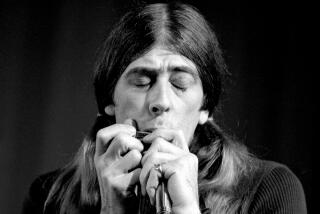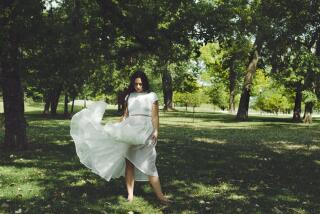The Paul Butterfield Blues Band, “The Paul Butterfield Blues Band” (1965) Ele<i> ktra</i>
- Share via
Just about every white blues musician in the ‘60s learned his or her craft by memorizing and mimicking records by the genre’s great artists. But Paul Butterfield--who grew up in Chicago, the hub of the electric urban blues movement that developed after World War II--actually apprenticed with many of the legends. As a teen-ager, the budding singer and harmonica player hung out at the blues clubs on the Windy City’s South Side until he managed to work his way onto the stage with the likes of Otis Rush and Howlin’ Wolf. So it may not have been a startling revelation when the debut album by Butterfield’s band turned out to be an authentic and moving representation of American blues.
Mixing covers with original material, “The Paul Butterfield Blues Band” bristles with uncommon conviction and passion. Like most memorable blues albums, it is most noteworthy for its earthy, sensual quality: Butterfield and company don’t just play the blues, they feel it. Indeed, the title of the deliciously languid track “Blues With A Feeling” sums up the album’s emotionally rich spirit.
Butterfield’s raw singing and wailing harmonica give the album a large part of its definition. But it is then-22-year-old Mike Bloomfield’s sizzling lead guitar that kicks many of these songs into unforgettable motion. The stomping “Look Over Yonders Wall” and the band’s version of “Shake Your Money-Maker” derive much of their frenetic energy from Bloomfield’s dexterous, tension-filled slide playing. Chipping in on rhythm guitar was another soon-to-be-well-known ax-man of his day, Elvin Bishop; the immovable foundation was provided by two former members of Howlin’ Wolf’s band, bassist Jerome Arnold and drummer Sam Lay.
(The same band--the same year that this album was released--became the first electric outfit with which Bob Dylan ever played publicly, during a Newport Folk Festival appearance that outraged folk purists and changed the course of American popular music).
More to Read
The biggest entertainment stories
Get our big stories about Hollywood, film, television, music, arts, culture and more right in your inbox as soon as they publish.
You may occasionally receive promotional content from the Los Angeles Times.










